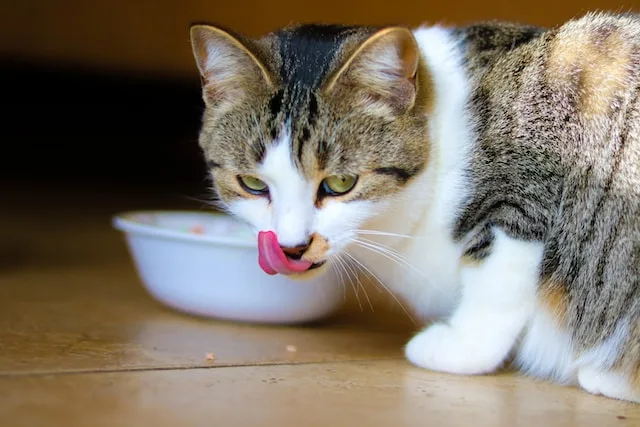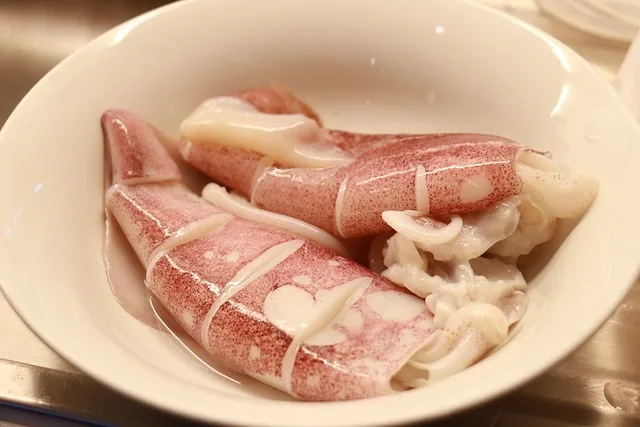“Can Cats Eat Squid?” When it comes to seafood, squid stands out as a polarizing delicacy. Loved by some and despised by others, it has found its place in various cuisines around the world. In America, calamari, which is essentially fried squid served with marinara sauce, is a popular dish. However, in the Mediterranean and other regions, squid takes on a much broader role, prepared in numerous delectable ways.
As a cat owner, you might wonder if sharing a bite of your squid with your feline companion would make for a special treat. But here’s the truth: it’s not recommended to offer squid to your cat. Although when prepared correctly, squid could be consumed by cats in small amounts without harm.
In this article, we will delve into the surprising facts about cats eating squid, exploring both the benefits and potential risks. Understanding the effects of squid on feline health is crucial for responsible pet owners. So, let’s uncover the truth behind this 5-star delicacy and find out if it can truly be a safe treat for our beloved cats.
Table of Contents
Do Cats Like Cooked Squid?

When it comes to the culinary preferences of our feline friends, squid tends to be a divisive seafood option. While some cats may develop an affinity for this exotic delicacy, others will simply turn up their noses at the mere sight of it. The rubbery texture of cooked squid often proves to be a major deterrent for many cats, making it less appealing than seafood like shrimp or salmon.
It’s worth noting that cats are notorious for their selective tastes, and cooked squid may not possess the enticing qualities necessary to capture their interest. Unlike other treats, such as fish or meat, which can be seasoned or prepared in various ways to enhance their aroma and flavor, squid is typically served plain, leaving little to entice finicky eaters.
For some cats, curiosity may lead them to give cooked squid a try, especially if they observe their owners indulging in it. However, whether they enjoy it or reject it after the first attempt is entirely unpredictable. The texture of squid, being rubbery, does not align with the usual preferences of most cats, who generally prefer softer, more tender food.
Fortunately, cats won’t miss out on any vital nutritional elements if they don’t take a liking to squid. It’s best to regard squid as an occasional treat, rather than a staple in their diet. Given its hit-or-miss appeal, incorporating squid into their mealtime can add a touch of variety, but it shouldn’t be a cause for concern if they don’t take to it.
In the following sections, we will delve deeper into the surprising facts surrounding cats and squid consumption, addressing the potential risks and benefits associated with this 5-star delicacy. By understanding the dynamics between cats and squid, we can make informed decisions about offering this treat to our beloved feline companions.
Risks of Feeding Your Cat Squid
While squid itself may not be intrinsically risky for felines, the readiness and serving strategies assume a pivotal part in deciding its reasonableness as a treat. When arranged accurately — bubbled and liberated from flavours — squid can be generally alright for your feline. In any case, offering squid arranged in alternate ways can present likely issues for your catlike friend.
Foodborne Sickness: Crude fish, including squid, ought to never be taken care of to felines. Utilization of crude fish, for example, sushi, opens felines to the gamble of foodborne diseases like salmonella or Vibrio vulnificus. These bacterial contaminations can prompt extreme gastrointestinal issues and represent a danger to their general well-being.
Stifling Peril: In any event, when bubbled, squid holds its rubbery and chewy surface. This surface can introduce a stifling peril, particularly for felines who are not familiar with such a consistency. Taking into account the likely dangers of gagging prior to offering squid to your cat is significant.
Seared with Flavors and Oil: In the US, calamari is a famous method for serving squid, commonly broiled and prepared. Be that as it may, broiled food is unfortunate for felines, similarly for all intents and purposes for people. Furthermore, the flavours utilized on calamari, like onion or garlic, can be destructive to felines whenever ingested in enormous sums. It’s ideal to stay away from seared and prepared squid while thinking about your feline’s dietary necessities.
Modified Hunger: Acquainting new and extraordinary food varieties with your feline’s eating routine can in some cases lead to an inclination for the new food and a refusal to devour their standard feline food. While this can happen with any food, felines’ liking for fish is notable, and offering squid as a treat conveys the gamble of making an unfortunate reliance or enslavement.
Given these expected dangers, it is critical to practice alert while thinking about squid as a treat for your feline. While it might offer an exceptional flavour insight, it ought to just be given with some restraint and after cautious thought of the singular feline’s well-being, inclinations, and dietary prerequisites. Continuously focus on your feline’s prosperity by talking with a veterinarian prior to bringing any new food sources into their eating routine.
Health Benefits of Cooked Squid for a Cat

While squid should only be considered as an extremely occasional treat for cats, there are some health benefits that can be derived from it, albeit in small quantities. One of the main advantages of squid is its high zinc content. Zinc is an essential mineral for cats, as it supports the maintenance of healthy skin and fur, and plays a crucial role in the reproductive function of female cats.
It’s important to note that consuming excessive amounts of zinc can lead to zinc poisoning, which can have severe consequences such as shaking, lethargy, loss of appetite, and even death. However, feeding your cat a small piece of squid on occasion is unlikely to result in such a response.
Apart from its zinc content, squid doesn’t offer significant additional health benefits for cats. Therefore, if your cat doesn’t particularly enjoy squid, they are unlikely to miss out on essential nutrients or health advantages.
It’s worth mentioning that kittens should not be given squid at all. Squid doesn’t provide any specific benefits for kittens, and their smaller size puts them at a higher risk of choking on the rubbery texture of squid. Therefore, it’s best to avoid introducing squid into the diet of young kittens.
In summary, while squid can offer a modest health benefit in terms of zinc content, it should only be given sparingly to cats. It’s essential to prioritize their safety, consider their preferences, and consult with a veterinarian before including squid in their diet.

How Much Cooked Squid Can My Cat Eat?
While certain cats might have an affection for squid, it’s vital to practice control while offering this delicacy to your catlike sidekick. Right off the bat, it’s significant that squid can be very costly, so it’s not something you need to give out too openly.
To forestall gagging dangers and to guarantee the squid is alright for utilization, it ought to be finely cut and all-around cooked. Taking care of your cat in excess of a tablespoon or so of squid isn’t suggested. Giving them a lot of squid can prompt an adoration for it that outperforms their advantage in different food varieties, which isn’t great for a reasonable eating routine. Besides, offering squid to your cat consistently is not monetarily economical.
A few pet people might decide to provide their cats with a little piece of cooked squid as a treat. However long the sum is restricted, not given too regularly, and the squid is appropriately cooked, it ought to be alright for your cat to consume.
The fact that some individuals consider pursues dried squid another decision. While it kills worries about unsafe microscopic organisms, it’s as yet significant not to allow your cat to have dried squid time after time, as it might begin to rule their ordinary eating routine. Moreover, consuming enormous amounts of dried squid can prompt a breakdown of thiamine, bringing about related incidental effects.
Taking everything into account, it’s urgent to control how much cooked squid you deal to your cat. By following fitting serving sizes, guaranteeing legitimate cooking, and keeping away from exorbitant utilization, you can securely get your cat this delicacy without undermining their general wellbeing and healthful equilibrium.
So, Can Cats Eat Squid?
“While cats can enjoy an occasional taste of squid, it should be treated as a special treat rather than a regular part of their diet. With proper preparation and moderation, squid can offer a unique flavor experience and a potential health benefit, but it’s crucial to prioritize your cat’s safety and consult with a veterinarian before indulging them in this 5-star delicacy.”
Dr. Chandrika
Tweet
In conclusion, while cats can eat squid, it should be considered a very occasional treat rather than a regular part of their diet. Squid may not be appealing to all cats due to its rubbery texture, making it a polarizing food option. When preparing squid for cats, it should be boiled and served plain, without any seasonings or additives. Raw squid should be avoided, as it can lead to foodborne illnesses.
Feeding cats squid in small quantities can provide a health benefit in terms of its high zinc content, promoting healthy skin, fur, and reproductive function in female cats. However, excessive amounts of zinc can lead to zinc poisoning, so moderation is key.
Choking hazards should be considered when offering squid to cats, as its texture can pose a risk. It’s crucial to finely cut the squid and ensure it is well cooked to minimize this risk.
Dried squid is an alternative, but it should still be given sparingly to prevent it from dominating the cat’s regular diet. Large quantities of dried squid can cause a breakdown of thiamine, resulting in associated side effects.
Ultimately, it’s important to prioritize your cat’s health and consult with a veterinarian before introducing any new foods into their diet. Squid should be treated as a special treat, offered in small amounts, and given with caution to ensure the well-being of your feline companion.


